The mental health of young people is one of the most pressing issues today. Youth face constant challenges, from academic stress to the pressures of social media.
Also Read
These struggles can lead to emotional difficulties, often overlooked until they worsen. Addressing these problems early can make a lasting difference in their lives.
Studies show that 1 in 5 adolescents experiences mental health issues, such as anxiety or depression. These challenges don’t just affect emotions. They can disrupt school, relationships, and future opportunities. The need for effective youth mental health services has never been greater.
This article explores the factors contributing to mental health in youth, the signs to watch for, and ways to provide support. It also highlights innovative approaches, like AI-driven mental health solutions. It includes proven methods, like counseling and therapy. With the right tools, young people can thrive despite life’s challenges.
Let’s explore strategies, insights, and advice to support young minds. Together, we can create a future where mental health is not a stigma but a priority.
Understanding Youth Mental Health
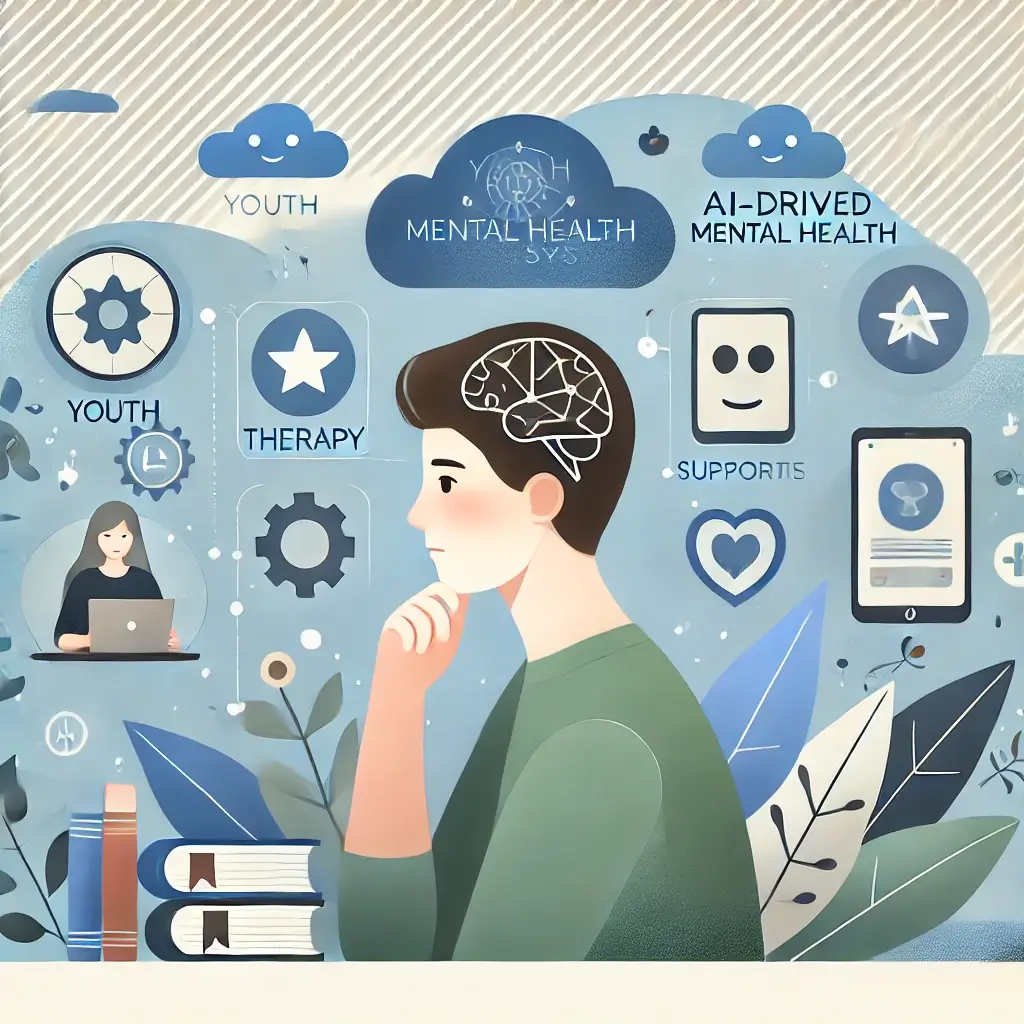
Youth mental health is a complex and critical topic. It encompasses the emotional, psychological, and social well-being of young individuals. To understand it, we must know the causes of the challenges and their effects on daily life.
What Is Youth Mental Health?
Mental health in youth refers to their ability to handle stress, build relationships, and make sound decisions. When this balance is disrupted, it can lead to conditions like anxiety, depression, or behavioral disorders. These issues are not uncommon. According to the CDC, 1 in 5 adolescents in the U.S. experiences mental health challenges yearly, underscoring the urgency of the matter.
Factors Influencing Youth Mental Health
- Biological Factors: Genetics and brain chemistry play significant roles in mental health.
- Environmental Factors: Family relationships, school environment, and community support are critical.
- Technological Influence: While technology can offer support through tools like AI-driven mental health solutions, overexposure to social media often worsens issues like anxiety and low self-esteem.
Signs of Mental Health Issues in Youth
Recognizing signs early is essential. Look for:
- Persistent sadness or irritability.
- Withdrawal from friends and family.
- Changes in sleep or eating patterns.
- Difficulty concentrating.
The Need for Youth Mental Health Services
Accessible and effective youth mental health services are crucial. They provide intervention, education, and support for young people, helping them navigate challenges and build resilience.
| Key Mental Health Statistics | Impact |
|---|---|
| 1 in 5 youths face mental health challenges annually | Highlights prevalence |
| 50% of lifetime mental illnesses begin by age 14 | Importance of early intervention |
Affiliate Resources
Support youth mental health initiatives with resources such as:
By understanding the nuances of youth mental health, society can take significant steps to provide the care and support young individuals need.
Factors Affecting Youth Mental Health

Understanding what influences youth mental health is key to providing the proper support. Family and technology are key to a young person’s mental health.
Biological Factors
Biology lays the foundation of mental health. Genetics can increase vulnerability to conditions like anxiety or depression. Additionally, brain chemistry changes during adolescence, which can amplify emotional responses. Hormonal shifts affect mood, complicating this phase of life.
Family and Social Environment
Family dynamics have a profound impact. Supportive and open communication at home can foster emotional stability. Homes characterized by conflict or neglect often lead to stress and insecurity. Social interactions with peers hold equal importance. Bullying or exclusion can severely harm self-esteem and emotional health.
Educational Pressures
School environments are often high-stress zones for youth. The pressure to excel and the fear of failure can cause anxiety. A lack of mental health resources in schools only exacerbates these challenges. Schools that focus on emotional education and counseling have better student outcomes.
Impact of Technology
Technology has both positive and negative aspects. While tools like AI-driven mental health apps offer access to support, overuse of social media can lead to anxiety and unrealistic comparisons. Studies show that too much screen time harms sleep. Poor sleep hurts mental health.
| Factor | Positive Impact | Negative Impact |
|---|---|---|
| Family Environment | Provides emotional support and guidance. | Conflict can create stress and insecurity. |
| Peer Relationships | Builds confidence and social skills. | Bullying damages self-esteem. |
| Technology | Access to mental health resources. | Overuse can lead to anxiety. |
Affiliate Resources for Support
Explore these tools and resources to foster better mental health:
By addressing these factors, families, schools, and communities can create a supportive environment for youth mental well-being. Together, we can reduce the stigma around mental health and ensure young individuals thrive.
Recognizing the Signs of Mental Health Issues in Youth

Early recognition of mental health problems in youth is critical for timely intervention. Knowing the symptoms can help parents, educators, and peers. They can then provide support before problems escalate.
Emotional Symptoms
Emotional signs are often the first indicators of mental distress. Persistent sadness or feelings of hopelessness can signal depression. Anxiety manifests as excessive worry or fear, often disrupting daily activities. In some cases, mood swings become frequent and unpredictable.
Behavioral Indicators
Changes in behavior are strong indicators of mental health concerns. Signs include: withdrawal from friends or family, loss of interest in activities, and energy changes. Youth might also exhibit risk-taking behaviors or aggression as a coping mechanism.
Cognitive Challenges
Mental health issues often impact cognitive functions. Difficulty concentrating, remembering, or making decisions is a clear sign. These challenges can affect academic performance and create extra stress for young individuals.
Physical Manifestations
Physical symptoms can also signal mental health issues. Common signs include fatigue, headaches, and unexplained body pains. Red flags include changes in sleep or appetite. They should not be ignored.
Common Conditions and Their Signs
| Condition | Key Symptoms |
|---|---|
| Anxiety | Excessive worry, restlessness, fatigue |
| Depression | Sadness, hopelessness, withdrawal |
| ADHD | Inattention, impulsivity, hyperactivity |
| Eating Disorders | Weight changes, body image concerns |
Supportive Steps
Recognizing these signs is the first step toward helping. Parents and educators can:
- Create open communication channels.
- Monitor changes in behavior or habits.
- Seek help from youth mental health services when necessary.
Explore tools like:
- Interactive self-help resources
- Books for understanding adolescent behavior
- Therapy aids for families
Early intervention can make a significant difference in a young person’s life, promoting better outcomes and a healthier future.
Prevention and Early Intervention Strategies for Youth Mental Health

Preventing mental health issues in youth requires proactive steps and early intervention. These strategies build resilience, promote good habits, and address worries before they grow.
Building Resilience in Youth
Resilience is the ability to bounce back from adversity. It is a critical skill for mental well-being. Encouraging problem-solving skills, self-confidence, and emotional awareness is foundational steps. Youth who learn these skills early are better equipped to face challenges.
Actionable Steps:
- Teach mindfulness techniques to manage stress.
- Encourage participation in community activities.
- Foster open communication to address worries.
Parental and Community Support
Parents and communities play vital roles in prevention. A supportive home environment fosters emotional stability. Communities that encourage open dialogue and provide youth mental health services create a safety net.
| Support Element | Impact |
|---|---|
| Open Communication | Builds trust and emotional connection. |
| Community Mental Health Programs | Provides resources and early intervention. |
The Role of Schools
Schools can create safe spaces for addressing mental health. Programs that teach emotional intelligence and coping strategies are beneficial. Training teachers to recognize early warning signs also aids in prompt intervention.
Examples of School-Based Programs:
- Emotional literacy workshops.
- Peer mentoring programs.
- Access to school counselors.
Leveraging Technology for Early Intervention
Digital tools, like AI-driven mental health apps, make support accessible. Apps can provide daily mood tracking, meditation guides, and crisis helplines. But, we must balance tech use with in-person interactions for better care.
Affiliate Resources
Equip yourself with tools to support youth mental health:
Preventing and intervening early in mental health issues leads to healthier, happier youth. Let’s prioritize mental well-being. We can do this by focusing on resilience, support, and education.
Treatment and Support Options for Youth Mental Health
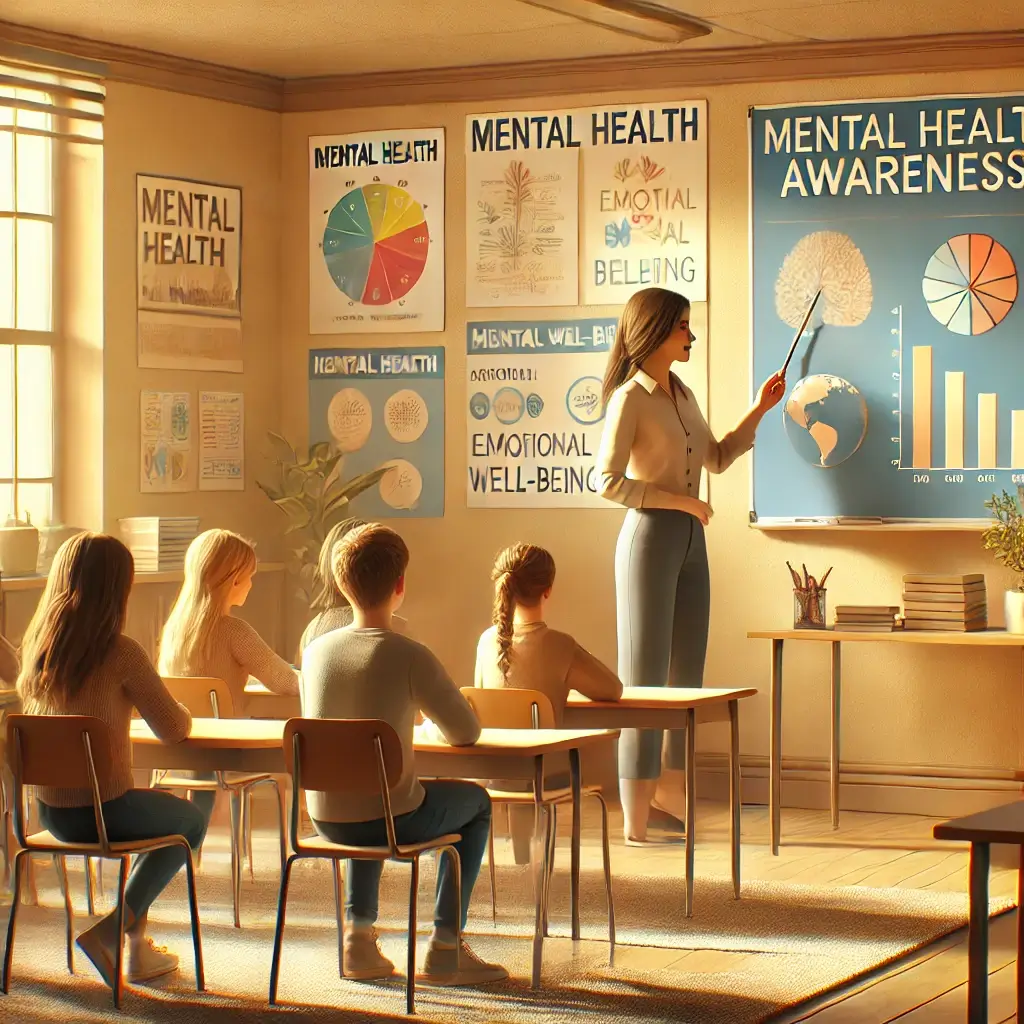
Providing the right treatment and support for youth mental health challenges is critical. Proper care helps young people thrive emotionally and mentally.
Therapeutic Interventions
Therapy is a cornerstone of mental health care. Options like Cognitive Behavioral Therapy (CBT) and Dialectical Behavior Therapy (DBT) are widely recommended. These therapies focus on building coping mechanisms and changing negative thought patterns.
Examples of Effective Therapies:
- CBT: Helps identify and challenge harmful thoughts.
- DBT: Teaches emotional regulation and mindfulness.
- Group Therapy: Offers peer support and shared experiences.
Medication Management
In some cases, medications can help. Antidepressants and anti-anxiety medicines treat depression and anxiety disorders. It’s essential to combine medication with therapy for holistic care.
School and Community Support Programs
Schools and communities are pivotal in providing accessible mental health care. Programs offering counseling and workshops on mental well-being empower students. Peer support groups are a community-based initiative. They create safe spaces for sharing and healing.
Digital Solutions and Technology
Technology is transforming mental health care. AI mental health apps now offer: daily mood tracking, guided meditations, and access to therapists. These tools bridge gaps in accessibility, making support available anytime.
| Support Type | Benefit |
|---|---|
| Therapy | Personalized care for emotional issues. |
| Medication | Stabilizes severe conditions. |
| Digital Tools | On-demand access to resources |
Affiliate Recommendations
Explore these trusted resources to enhance mental well-being:
Providing the right mix of therapeutic options, medication, and community support ensures youth have a comprehensive care network. By leveraging innovative tools and traditional methods, we can address mental health challenges effectively.
The Role of Technology in Youth Mental Health
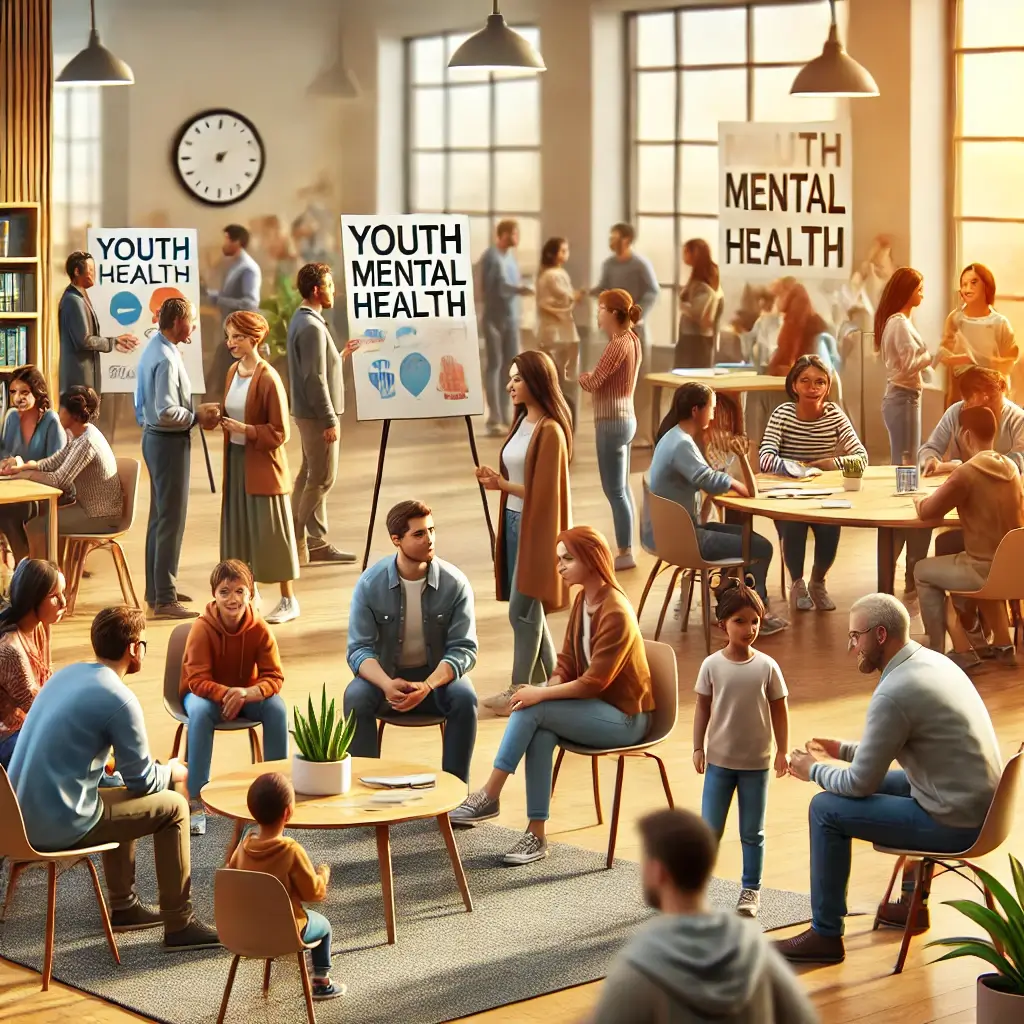
Technology has transformed how mental health services are delivered, especially for young people. From apps to teletherapy, digital tools offer accessible, effective support. However, balancing technology’s benefits and risks is essential to ensure its positive impact.
How Technology Supports Mental Health
- Accessibility: Digital platforms break down geographical and financial barriers. Apps and online counseling provide support to individuals who might not have access to traditional services.
- Immediate Assistance: Features like mood tracking, guided meditation, and crisis helplines ensure timely intervention.
- Personalization: AI-based tools offer customized care plans tailored to individual needs.
Popular Mental Health Apps for Youth
| App Name | Key Features |
|---|---|
| Calm | Meditation and stress management tools. |
| Headspace | Guided mindfulness exercises. |
| BetterHelp | Access to licensed therapists online. |
Risks of Technology Overuse
While technology provides solutions, excessive use poses risks. Social media can increase feelings of inadequacy and isolation. Over-reliance on apps may delay seeking professional help.
How to Maximize Benefits
- Set healthy boundaries for screen time.
- Choose apps backed by mental health experts.
- Combine technology with traditional therapy for comprehensive care.
Affiliate Recommendations
Explore tools that integrate technology into mental health care:
Technology is a valuable ally in addressing youth mental health. With thoughtful use, it can empower young people to navigate challenges and build resilience.
Policy and Advocacy for Youth Mental Health
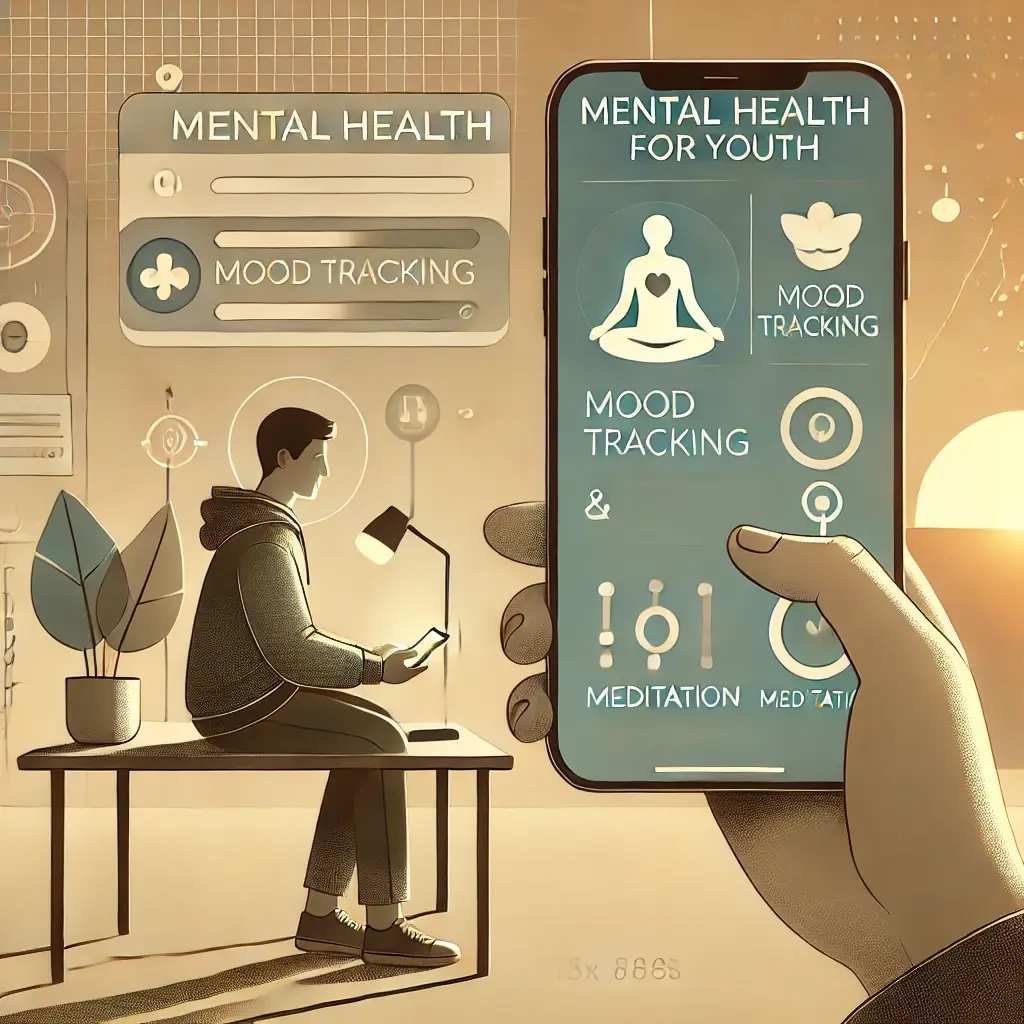
Creating meaningful change in youth mental health requires robust policies and active advocacy. By influencing legislation, increasing awareness, and fostering community involvement, stakeholders can ensure a supportive environment for young individuals.
Current Policies on Youth Mental Health
Governments and organizations worldwide have introduced policies to address mental health challenges. These policies aim to:
- Provide accessible mental health services in schools.
- Increase funding for mental health programs.
- Encourage mental health education for families and educators.
For instance, the U.S. has enacted policies like the Mental Health Services Act to expand access to resources.
The Role of Advocacy
Advocacy bridges gaps in awareness and action. Grassroots movements, led by parents, educators, and mental health professionals, often drive change. Social campaigns on platforms like Twitter and Instagram amplify these efforts.
Successful Advocacy Examples:
- Campaigns to destigmatize therapy among youth.
- Petitions for increased school counseling budgets.
- Mental health awareness weeks in schools.
Future Directions
Future policies must address:
- Integrating mental health into primary healthcare.
- Expanding telehealth services for rural communities.
- Ensuring culturally sensitive mental health resources.
Community Involvement and Support
Communities play a crucial role. Local initiatives like support groups and youth workshops foster connection and provide resources. Partnerships between schools, families, and organizations ensure comprehensive care.
| Action | Impact |
|---|---|
| Increased School Funding | More counselors and programs available. |
| Legislative Advocacy | Long-term systemic improvements. |
| Community-Based Programs | Immediate, localized support. |
Affiliate Recommendations
Explore these resources to support mental health advocacy:
- Educational tools for awareness campaigns
- Books on advocacy and mental health
- Materials for organizing events
Advocacy and policy are pillars of a healthier future for youth. By working together, communities can inspire systemic change, ensuring every young person has the support they need.
FAQ Section: Addressing Common Questions About Youth Mental Health
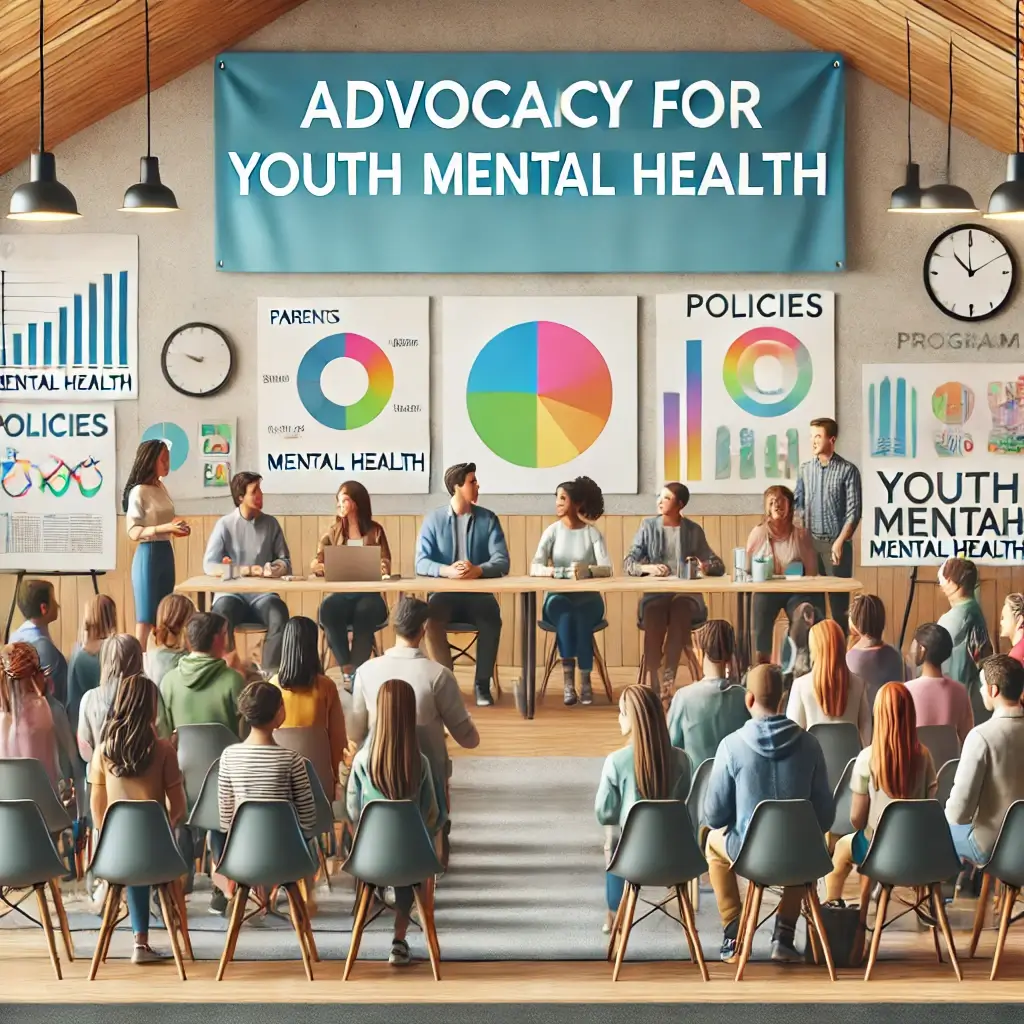
1. What are the most common mental health issues in youth?
The most common issues include anxiety disorders, depression, and attention-deficit/hyperactivity disorder (ADHD). These conditions often manifest as changes in mood, behavior, and cognitive ability.
2. How can parents support their child’s mental health?
Parents can provide a supportive environment by maintaining open communication, observing changes in behavior, and seeking professional help when needed. Tools like self-help guides can also assist in navigating this journey.
3. Are digital tools effective for youth mental health?
Yes, AI-driven mental health apps and digital platforms are valuable for accessibility and early intervention. They should, however, complement traditional methods like therapy for the best results.
4. How can schools contribute to youth mental health?
Schools can implement emotional literacy programs, provide counseling services, and train staff to recognize warning signs of mental health issues. Collaboration with families and communities is essential.
5. What are signs that a young person might need professional help?
Warning signs include persistent sadness, withdrawal from activities, drastic changes in behavior, and physical symptoms like fatigue or poor sleep. Early intervention can prevent issues from worsening.
6. Can mental health conditions in youth be prevented?
While not all conditions can be prevented, building resilience, fostering supportive relationships, and encouraging healthy habits can reduce risks. Early education on mental health plays a crucial role.
7. Where can I find affordable mental health resources for youth?
Explore these links for accessible support:
Conclusion: Creating a Brighter Future for Youth Mental Health

Addressing youth mental health is not just a priority but a responsibility shared by families, schools, and communities. The challenges young people face today—ranging from academic stress to the impact of social media—require proactive solutions and a supportive environment.
By understanding the underlying factors, recognizing early signs, and implementing prevention strategies, we can significantly improve mental well-being among youth. Innovative tools like AI-driven mental health apps, combined with traditional therapy and community programs, offer a well-rounded approach. Advocacy and policy reforms further ensure that no child is left behind.
Key Takeaways:
- Recognize the emotional, behavioral, and cognitive signs of mental health struggles.
- Leverage school and community support systems to provide immediate assistance.
- Utilize technology responsibly to enhance accessibility to mental health resources.
| Support Resources | Benefits |
|---|---|
| Advocacy Campaigns | Amplify awareness and drive systemic change. |
| Digital Mental Health Tools | Provide on-demand, tailored support. |
| Family and Community Engagement | Build trust and offer a safety net. |
Explore actionable resources like:
- Mental health guides and tools
- Books for understanding and fostering resilience
- Digital aids for therapy and well-being
Together, by fostering open dialogue, enhancing support systems, and embracing innovation, we can ensure that every young individual grows up with the tools they need to lead a fulfilling, mentally healthy life.
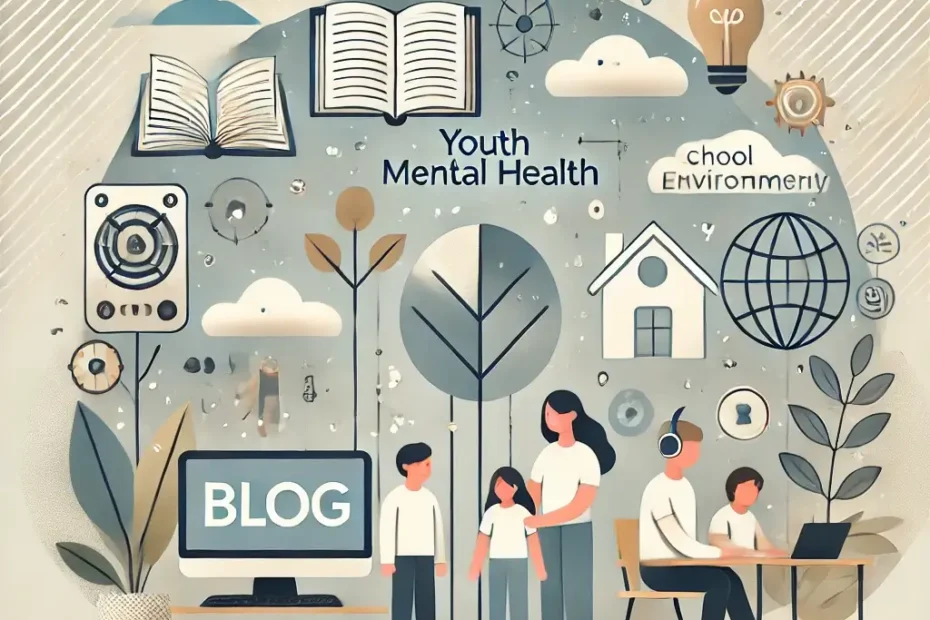


Pingback: Understanding and Overcoming Mental Health Challenges in Adults - A Comprehensive Guide of 2025
Купить Хавал – только у нас вы найдете цены ниже рынка. Быстрей всего сделать заказ на haval jolion можно только у нас!
хавал джулиан купить в уфе
хавал джолион цена новый у официального – http://jolion-ufa1.ru/
Your balance has increased. Don’t lose it — log in today! – http://extras.byethost4.com/?sid=5166
Just thinking about you gives me chills… come closer – https://rb.gy/es66fc?LokIdiox
Купить Haval – только у нас вы найдете цены ниже рынка. Быстрей всего сделать заказ на новый haval jolion можно только у нас!
haval jolion цены и комплектации
haval джулион – http://jolion-ufa1.ru/
Чего нельзя делать при синдроме беспокойных ног, частые недоразумения.
Секретные методы борьбы с синдромом беспокойных ног, что действительно помогает?
препараты от синдрома беспокойных ног https://bespokoynyye-nogi.ru/ .
бетадин при месячных https://svechi-dlya-zhenshchin.ru/ .
I never believed in online dating until I tried this site. Now I’m chatting with girls from my city every evening – https://d.webtune.space/
HeMerne
Подробная инструкция по применению супрастинекса, важная информация для пациентов.
Супрастинекс: как принимать для максимального эффекта, секреты успешного лечения.
Полная инструкция по использованию супрастинекса, эффективные стратегии лечения.
Секреты эффективного применения супрастинекса, информация от специалистов.
Узнайте все о применении супрастинекса: подробная инструкция, подсказки для эффективного лечения.
Как правильно использовать супрастинекс: полная инструкция, рекомендации для пациентов.
Супрастинекс: подробная инструкция для пациентов, эффективные стратегии использования.
Инструкция по применению супрастинекса для максимальных результатов, подсказки для пациентов.
Как правильно принимать супрастинекс: полная инструкция, рекомендации от специалистов.
Как использовать супрастинекс: подробная инструкция и советы экспертов, подсказки для эффективного лечения.
супрастинекс 5 мг инструкция https://suprastinexxx.ru/ .
Купить Haval – только у нас вы найдете разные комплектации. Быстрей всего сделать заказ на хавал официальный дилер можно только у нас!
haval 2024
автомобиль хавал цена – http://www.haval-msk1.ru
Здравствуйте. Сделай переход на http://tprf.org.ua/znakomtes-industrialnye-parki.htm и узнавай больше нового.
I’d love to get to know you! Write me here
Message me there! —> https://rb.gy/44z0k7?LokIdiox
“I sense we have plenty in common. Drop by https://rb.gy/44z0k7?LokIdiox ?”
Выбор аксессуаров для дизайнерской мебели премиум-класса.
Дизайнерская мебель премиум-класса http://byfurniture.by/ .
Si te apasiona los juegos de azar en Espana, has llegado al portal correcto. En este sitio encontraras informacion detallada sobre los mejores casinos disponibles en Espana.
?Por que elegir un casino espanol?
Licencias oficiales para jugar con proteccion completa.
Promociones especiales que aumentan tus posibilidades de ganar.
Amplia variedad de juegos con premios atractivos.
Transacciones confiables con multiples metodos de pago, incluyendo tarjetas, PayPal y criptomonedas.
Lista de los casinos mas recomendados
En este portal hemos recopilado las valoraciones detalladas sobre los casinos con mejor reputacion en Espana. Consulta la informacion aqui:
casinotorero.info
Empieza a jugar en un casino confiable y aprovecha todas las ventajas.
Заказать Джили – только у нас вы найдете разные комплектации. Быстрей всего сделать заказ на дилерский центр джили можно только у нас!
новый geely
купить авто джили – http://geely-v-spb1.ru/
С Fun Sun путешествие в Турцию станет реальностью, легко.
Туроператор Fun Sun туры в Турции из Москвы http://bluebirdtravel.ru .
Купить Танк – только у нас вы найдете цены ниже рынка. Быстрей всего сделать заказ на дилер танк в спб можно только у нас!
дилер tank в санкт петербурге
автомобиль танк джип китайский – http://tankautospb.ru/
Как создать атмосферу роскоши в вашем доме.
Мебель премиум https://www.byfurniture.by/ .
Новые тренды в мире дизайнерской мебели.
Мебель премиум-класса https://www.byfurniture.by .
Разыскиваете проверенную помощь в уборке квартиры в Санкт-Петербурге? Наша команда профессионалов гарантирует чистоту и порядок в вашем доме! Мы применяем только безопасные и эффективные средства, чтобы вы могли вкушать свежестью без хлопот. Переходите https://klining-uslugi24.ru – Уборка дома после ремонта Не упустите уникальную возможность сделать свою жизнь проще и комфортнее.
haval 7 haval 7 .
Заказать Тэнк – только у нас вы найдете цены ниже рынка. Быстрей всего сделать заказ на дилер авто танк можно только у нас!
сколько стоит автомобиль танк
дилер танк в санкт петербурге – http://tankautospb.ru
дилер танк 500 https://tankautospb.ru/models/tank-500/ .
Ищете надежную помощь в уборке вашей в Санкт-Петербурге? Наша команда профессионалов гарантирует чистоту и и порядок в вашем доме! Мы применяем только безопасные и эффективные средства, чтобы вы могли вкушать свежестью без хлопот. Перемещайтесь к https://chisto-v-srok.ru
Ищете надежную помощь в уборке квартиры в Санкт-Петербурге? Наша группа профессионалов дает гарантию чистоту и и порядок в вашем доме! Мы используем только безопасные и эффективные средства, чтобы вы могли вкушать свежестью без хлопот. Переходите https://klining-uslugi24.ru – Заказать уборку Не прозевайте шанс сделать свою жизнь легче и удобнее.
Экзотические курорты с лучшими условиями.
Екзотични почивки https://www.ekzotichni-pochivki.com/ .
Как работать с контроллерами Siemens, для начинающих.
Лучшие практики программирования контроллеров Siemens, методы.
Как использовать TIA Portal для программирования, главные функции.
Как избежать ошибок в программировании контроллеров Siemens, узнайте.
Этапы проектирования с контроллерами Siemens, для успешной реализации.
Топ контроллеров Siemens на рынке, параметры.
Использование языков программирования в Siemens, для повышения эффективности.
Лучшие решения автоматизации с контроллерами Siemens, кейсы.
Будущее контроллеров Siemens, что ожидает.
Разработка пользовательских интерфейсов для контроллеров Siemens, основные шаги.
Настройка контроллера Siemens https://www.programmirovanie-kontroller.ru/#Настройка-контроллера-Siemens – https://www.programmirovanie-kontroller.ru/ .
Наведение порядка в СПб! Избавьтесь от забот, передайте заботы в руки специалистов! Закажите прямо сейчас Переходите https://service-cleanspb.ru
Уютная обивка утратила былй лоск? Химчистка мебели на дому в СПб! Вернем диванам, креслам и пушистым коврам их истинную красоту. Профессиональные средства и знающие свое дело мастера. Бонусы новобранцам! Узнайте подробности! Выбирайте Сухая химчистка мягкой мебели
Обзор популярных брендов куклевых бебета.
Истински кукли бебета http://kukli-bebeta.com/ .
Двигайтесь к Уборка квартиры в СПб расценки
Как выбрать источник бесперебойного питания, разберитесь.
Обзор источников бесперебойного питания, читайте.
Обзор функций источников бесперебойного питания, в этой статье.
Как выбрать ИБП для вашего оборудования, в специализированной статье.
Все о ИБП, разберитесь.
Советы по покупке источников бесперебойного питания, в нашем блоге.
Обзор актуальных источников бесперебойного питания, в анализе.
Как работает источник бесперебойного питания, в нашем материале.
Советы по использованию ИБП, получите советы.
Тенденции рынка источников бесперебойного питания, посмотрите.
Основные рекомендации по использованию ИБП, узнайте.
Как выбрать ИБП для разных нужд, в этой статье.
Инсайдерские советы по выбору источников бесперебойного питания, в нашем анализе.
Рейтинг популярных источников бесперебойного питания, читайте.
Советы по монтажу источников бесперебойного питания, узнайте.
Идеальные решения для бесперебойного питания, в гиде.
Устранение неисправностей ИБП, получите советы.
Сравнение моделей источников бесперебойного питания, здесь.
Топ-10 источников бесперебойного питания на рынке, в гиде.
бесперебойники https://istochniki-bespereboynogo-pitaniya.ru .
Не знаете, как быстро подарить эмоции?
Тогда вам стоит обратить внимание на интересную статью о https://mavashimisha.ru/novosti/34989-dostavka-cvetov-v-moskve-ot-azalianow-ocharovatelnye-bukety.html в Москве.
Это просто находка для тех, кто ценит эмоции.
Мы рекомендуем прочитать о том, как оформить заказ за пару минут.
Курьеры приезжают точно в срок, а цветы всегда свежие и красиво оформлены.
Выбирайте проверенное качество!
hi
Все о процедуре несъемного протезирования на 4 имплантах.
Протезирование на 4 х имплантах https://www.ggpatl.by/allon4-implantaciya .
Преимущества перед съемными протезами.
Мостовидные протезы зубов https://www.belfamilydent.ru/services/mostovidnoe-protezirovanie .
Плюсы и минусы зубных мостов.
Поставить зубной мост https://koronki-blog.ru/mostovidnoe-protezirovanie/ .
Советы по имплантации зубов на 4 имплантах.
All on 4 имплантация All on 4 имплантация .
Выбирайте https://himchistka-msk24.ru/